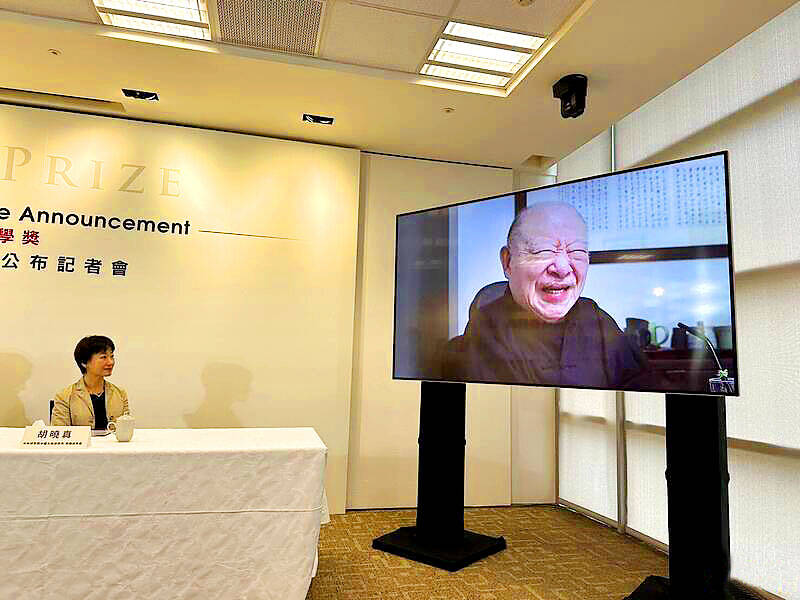Academia Sinica fellow and famed Taiwanese-American historian Hsu Cho-yun (許倬雲) died on Sunday in Pittsburgh, Pennsylvania, at age 95.
Hsu played a vital role in founding the Chiang Ching-kuo Foundation for International Scholarly Exchange.
After receiving the Tang Prize in Sinology last year, Hsu donated the cash prize of NT$50 million (US$1.67 million) to the foundation.

Photo: Yang Yuan-ting, Taipei Times
He also founded the Hsu-Sun Scholarship, together with his wife of 55 years, Sun Man-li (孫曼麗), to encourage young people to study Sinology.
Hsu was born in Xiamen, China, in 1930 and moved to Taiwan in 1948, where he studied history at National Taiwan University before moving to the US in 1957 to pursue a doctoral degree at the University of Chicago. He integrated social science methods into historical research, opening new directions in Sinology.
After the age of 81, he began a decade of prolific historical writing, working tirelessly to bring historical scholarship into public discourse and publishing the book China: A New Cultural History in 2012.
He continued to develop systematic historical narratives on China’s expansion from the Yellow and Yangtze river regions to the southeastern coast and into Southeast Asia.
His writings reflect a deep concern for nation and people, and his research retained a rational dimension within its pro-China leanings.
Hsu often wrote to Taiwanese media to express his opinions on current affairs and advocated for openness when chatting with former president Chiang Ching-kuo (蔣經國).
Over the past five years, Hsu often shared his outlook on life and history on Chinese media platforms, which was well-received by Chinese people.
Last year, in a pre-recorded speech delivered at the National Central Library, Hsu voiced concern over Western political trends. For example, when US President Donald Trump spoke about charging allies for protection, Hsu said it reminded him of the thugs who once roamed the foreign concessions in Shanghai.
Despite being born with congenital muscular atrophy that left his limbs bent, and later becoming paralyzed in old age, Hsu continued to read, study and pursue scholarship diligently every day.

POSITIVE DEVELOPMENT: Japan and the US are expected to hold in-depth discussions on Taiwan-related issues during the meeting next month, Japanese sources said The holding of a Japan-US leaders’ meeting ahead of US President Donald Trump’s visit to China is positive news for Taiwan, former Japan-Taiwan Exchange Association representative Hiroyasu Izumi said yesterday. After the Liberal Democratic Party’s landslide victory in Japan’s House of Representatives election, Japanese Prime Minister Sanae Takaichi is scheduled to visit the US next month, where she is to meet with Trump ahead of the US president’s planned visit to China from March 31 to April 2 for a meeting with Chinese President Xi Jinping (習近平). Japan and the US are expected to hold in-depth discussions on Taiwan-related issues during the

‘LIKE-MINDED PARTNER’: Tako van Popta said it would be inappropriate to delay signing the deal with Taiwan because of China, adding he would promote the issue Canadian senators have stressed Taiwan’s importance for international trade and expressed enthusiasm for ensuring the Taiwan-Canada trade cooperation framework agreement is implemented this year. Representative to Canada Harry Tseng (曾厚仁) in an interview with the Central News Agency (CNA) said he was increasingly uneasy about Ottawa’s delays in signing the agreement, especially as Ottawa has warmed toward Beijing. There are “no negotiations left. Not only [is it] initialed, we have three versions of the text ready: English, French and Mandarin,” Tseng said. “That tells you how close we are to the final signature.” Tseng said that he hoped Canadian Prime Minister Mark Carney

Taiwan has received more than US$70 million in royalties as of the end of last year from developing the F-16V jet as countries worldwide purchase or upgrade to this popular model, government and military officials said on Saturday. Taiwan funded the development of the F-16V jet and ended up the sole investor as other countries withdrew from the program. Now the F-16V is increasingly popular and countries must pay Taiwan a percentage in royalties when they purchase new F-16V aircraft or upgrade older F-16 models. The next five years are expected to be the peak for these royalties, with Taiwan potentially earning

President William Lai (賴清德) yesterday bestowed one of Taiwan’s highest honors on Saint Vincent and the Grenadines (SVG) Ambassador Andrea Clare Bowman in recognition of her contributions to bilateral ties. “By conferring the Order of Brilliant Star with Grand Cordon on Ambassador Bowman today, I want to sincerely thank her, on behalf of the Taiwanese people, for her outstanding contribution to deepening diplomatic ties between Taiwan and SVG,” Lai said at a ceremony held at the Presidential Office in Taipei. He noted that Bowman became SVG’s first ambassador to Taiwan in 2019 and